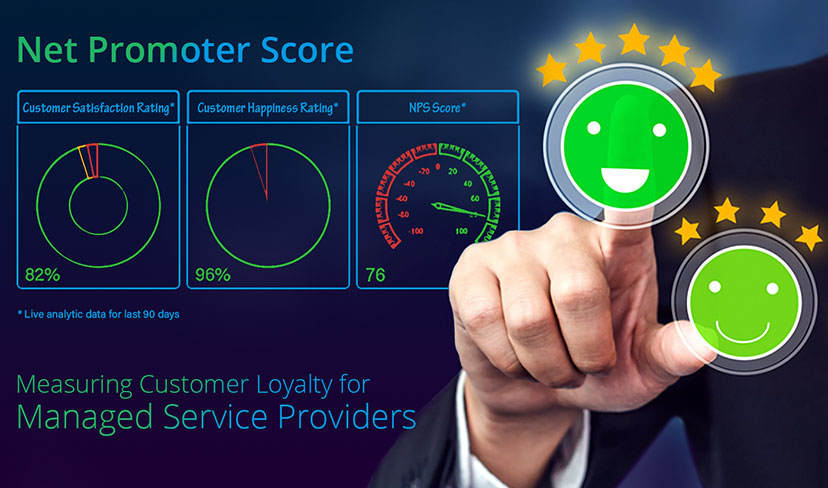Introduction
In today’s competitive business world, keeping customers happy and loyal is more critical than ever. With so many options available, customers are likely to switch service providers if they feel that their needs are not being met. One way to measure customer loyalty is by using the Net Promoter Score. In this article, we’ll explore what NPS is, why it’s essential, and why managed service providers should pay attention to their NPS.
What is the Net Promoter Score?
Net Promoter Score is a customer loyalty metric developed by Fred Reichheld, a business strategist at Bain & Company, in 2003. The metric is based on the idea that there are three types of customers: Promoters, Passives, and Detractors.
Promoters are customers who are extremely satisfied with a product or service and are likely to recommend it to others. Passives are satisfied customers, but they are not enthusiastic enough to recommend the product or service to others. Detractors are unhappy customers who are likely to discourage others from using the product or service.
To calculate NPS, customers are asked one question: “On a scale of 0 to 10, how likely are you to recommend our product or service to a friend or colleague?” Based on their responses, customers are grouped into one of the three categories mentioned above. The NPS is then calculated by subtracting the percentage of Detractors from the percentage of Promoters.
Why is Net Promoter Score Important?
Net Promoter Score is essential because it provides a clear and straightforward measure of customer loyalty. It’s a simple metric that can be used to track changes in customer loyalty over time, making it a valuable tool for improving customer satisfaction and retention.
Moreover, NPS is an essential metric for businesses because it correlates strongly with business growth. According to Reichheld, companies with high NPS scores tend to grow at a faster rate than companies with low Net Promoter scores.
Net promoter Score is also important because it provides actionable insights into what businesses can do to improve customer loyalty. For example, if a business has a high percentage of Detractors, it may need to focus on improving its customer service or product quality.
Why is it important for Managed Service Providers (MSPs) to track NPS?
Managed Service Providers (MSPs) are service providers that provide IT solutions and support to businesses. As with any other business, customer loyalty is critical for MSPs.
Tracking Net Promoter Score can help MSPs to understand how satisfied their customers are with their services. By identifying areas where customers are unhappy or dissatisfied, MSPs can make improvements that will increase customer loyalty and retention.
Additionally, high NPS scores can be a valuable marketing tool for MSPs. A high NPS score indicates that a business has a high level of customer satisfaction, which can be a powerful differentiator in a crowded market.
How to Measure Net Promoter Score for MSPs?
MSPs can measure NPS by sending a survey to their customers. The survey should include the NPS question and may also include additional questions to provide more context and insights. At Transputec, we send a survey after each ticket resolution to see how customers felt with their experience on the service. Most importantly when measuring NPS, it’s essential to focus on the quality of the data collected. MSPs should ensure that they are surveying a representative sample of their customers and that the survey is structured in a way that produces reliable and actionable data.
When it comes to Net Promoter Score, a good score versus a bad score depends on the industry and the company’s goals. Generally, an NPS score of 50 or higher is considered excellent, while a score of 30 to 40 is considered good. Scores below 0 are considered poor, and scores in the negative range indicate that there are more detractors than promoters.
However, it’s important to note that these benchmarks can vary by industry and company. For example, a high NPS score in the hospitality industry may be around 70, while a high NPS score in the software industry may be closer to 40. Transputec has a live NPS score available on our home page www.transputec.com and we have been operating a NPS of over 82% for many years which in the higher end of excellent.
Ultimately, what matters most is that companies track their Net promoter Score over time and strive to improve it. By continually working to improve customer satisfaction and loyalty, companies can achieve higher NPS scores and reap the benefits that come with them.
Conclusion
In summary, Net promoter Score is a simple yet powerful metric that can help businesses measure customer loyalty and identify areas for improvement. MSPs should pay close attention to their NPS scores, as they provide valuable insights into how satisfied their customers are with their services. By using NPS to measure and improve.






